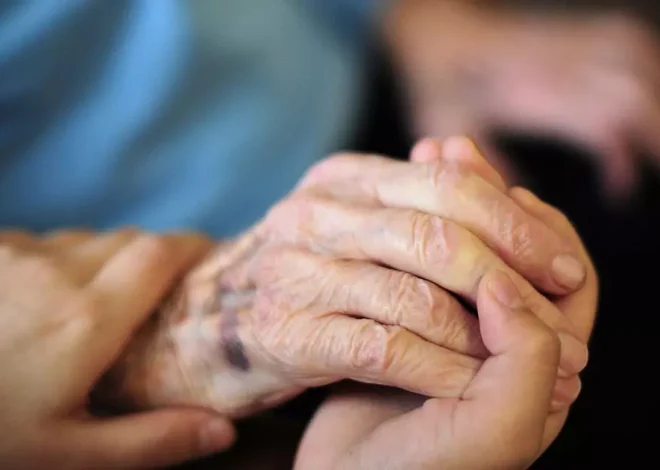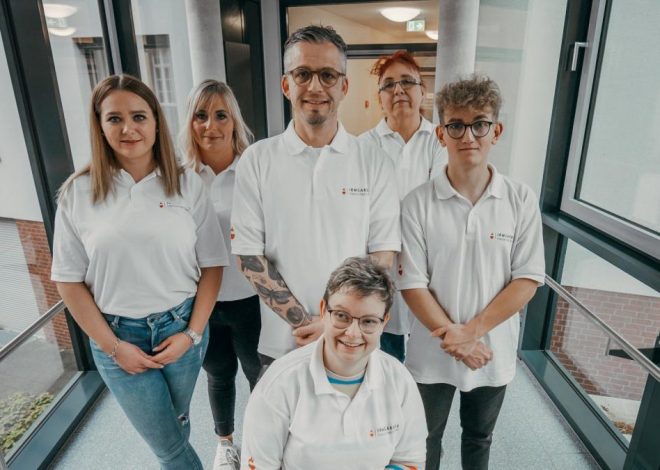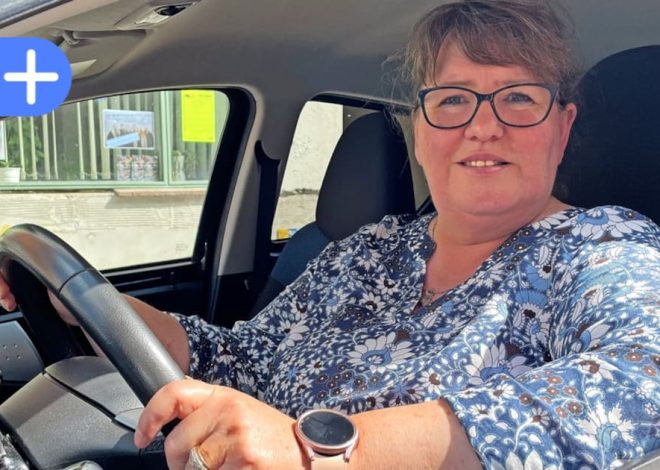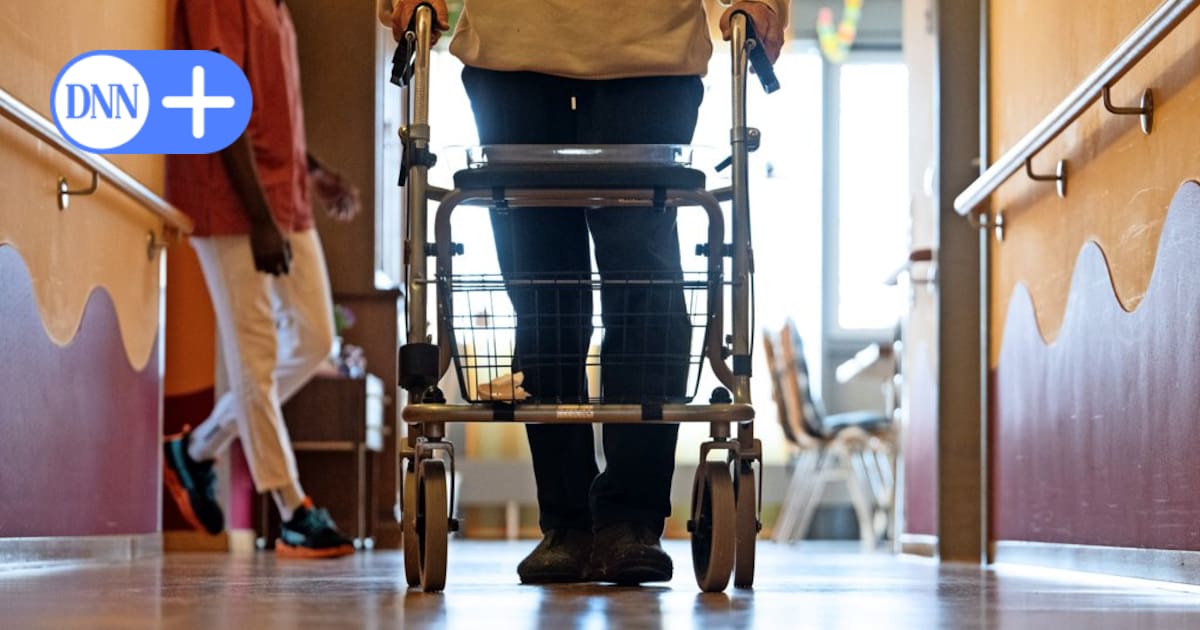
Can immigrants in Dresden provide care?
Dresden. The young woman is still on edge. Her breathing slowly calms down. A thick braid falls over her shoulder, she smiles. Rosa Aneidy Suárez Sánchez, 24 years old, comes from Cuba and works as a nursing assistant in the AWO senior citizens’ center “Rainer Fetscher” in Großzschachwitz. One task follows the next. Now, on a morning in early April, she has taken three minutes. Three minutes to talk about her journey from the Caribbean to Dresden.
Read more after the Advertisement
Read more after the Advertisement
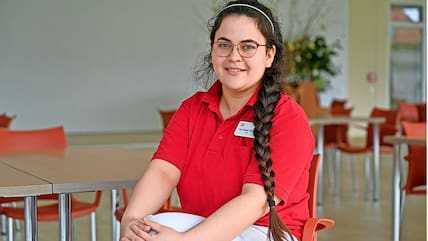
Rosa Aneidy Suárez Sánchez
Source: Anja Schneider
“I never thought I would come to Germany,” she says. In Cuba she wanted to study medicine. But when her husband, a physicist, received an offer from the Max Planck Institute, she went with him. Her dream of becoming a doctor is over for now. “I believe that family comes first,” says Rosa Sánchez. Now she helps old people with their everyday lives: getting up, washing, showering, eating, maybe going for a walk. And: “I have to document everything too.” Then her pager rings. “Oh, sorry,” she says. Work is calling.
Without immigration from abroad, the supply is in danger
There is a lot to do in the nursing home. Not just in Großzschachwitz, but in all of Dresden, in Saxony and everywhere in Germany. The problem has been known for years: the population is getting older and older, and more and more people need to be cared for. But at the same time there is a lack of skilled workers who can meet the demand. That is why hope is resting on women like Rosa Sánchez. On people who leave Cuba, Vietnam or Brazil to care for the elderly and sick in Germany.
Read more after the Advertisement
Read more after the Advertisement
Without immigration from abroad, the care system will collapse – this insight has become widespread in many parts of politics. The federal and state governments are passing laws to promote the immigration of skilled workers. But how does this work in practice? Can immigrants secure care in Dresden?
Beds in Dresden homes must remain empty
Last year, the Dresden employment agency was notified of 302 vacancies in the nursing sector, including 180 skilled positions. The current DAK nursing report shows that almost one in five skilled nursing staff will retire in the next ten years. According to this, Saxony is also heading towards the tipping point at which the number of people leaving the profession exceeds the number of people entering it.
In facilities such as the Fetscher Senior Center, the lack of staff has already resulted in beds remaining empty. Parts of the home are unused, says Nico Herbrich, the center’s director. From discussions with colleagues at other facilities, he knows that empty beds can be observed throughout Dresden.
The AWO is moving heaven and earth to recruit new employees. The starting salary for skilled workers was increased significantly at the beginning of the year. It is now 3,450 euros and can rise to around 4,300 euros for longer periods of employment. The duty rosters are comparatively relaxed, as employees confirm. Residents praise the care. And the facility also advertises on social media: employees made a video that had 250,000 views.
Read more after the Advertisement
Read more after the Advertisement
120 applicants – but not enough qualified specialists
According to Herbrich, all of this contributed to the fact that 120 applicants finally applied, which was certainly a success. However, there were still not enough qualified specialists among them. Herbrich needs six to eight more of them, he says, so that he can make better use of the company’s capacities.
For some time now, the AWO has been relying on staff from abroad. Twelve nations are represented in the Fetscher Center. But bringing people to Germany is not that easy. Excessive bureaucracy is still hampering immigration.
And then the authorities come into play
A lot of time passes before an applicant from Vietnam, for example, can start his training in Saxony. “We plan nine months in advance,” says Constanze Krüger. She works for the Anerkannte Schulgesellschaft (ASG), which runs vocational schools for nursing professions in Dresden and other places. Krüger’s job is to manage the process – from the application of a Vietnamese to his accommodation in Dresden.
Applicants write the application in German, add a CV and a letter of motivation as well as a high school diploma, vaccination certificates and at least a B1 language certificate. If the applicant meets the requirements, the authorities come into play. The recognized school association must coordinate with the German embassy, the immigration authorities and the Federal Foreign Office. And that can take time.
Read more after the Advertisement
Read more after the Advertisement
Sometimes, says Krüger, questions are asked even though the information can be found in the documents. Sometimes the authorities send documents to the wrong city. Another strange thing: According to Krüger, a certificate of good conduct from Vietnam is not recognized in Germany. Applicants must apply for a document from German authorities after entering the country.
Free State wants to facilitate recognition of skilled workers
The problem with the recognition of documents and qualifications is also a concern for Nico Herbrich from the AWO. The new Skilled Immigration Act is now in force. Since April, it should be easier for nursing assistants to gain a foothold in the German labor market. And the coalition in the Free State has also recently passed a resolution to make it easier to recognize skilled workers. But Herbrich cannot yet say how this will work in practice.
In any case, you only hear good things about the immigrants who have made it to Dresden at the Fetscher Center. For example, about Mohamed Hassan Ahmed, a 23-year-old whose dark brown eyes radiate a lot of calm. He fled from Somalia years ago. He is now being trained as a nursing professional in the AWO home. He enjoys the work and travels a lot in his free time. And he also likes Dresden. Although there are exceptions.
Racists insult nursing staff
Every now and then, Ahmed gets on a bus or is walking down the street and suddenly he hears someone shouting: “Foreigners, go away.” How does he react? “It’s a bit difficult. But you listen and move on. For me, it’s part of everyday life.”
Read more after the Advertisement
Read more after the Advertisement
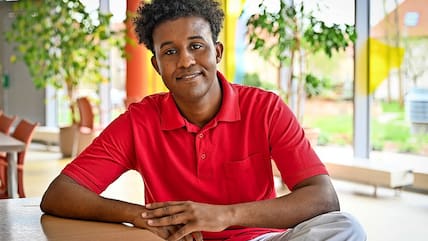
Mohamed Hassan Ahmed fled Somalia a few years ago.
Source: Anja Schneider
A problem that many migrants in Dresden are familiar with. AWO spokesman Andreas Szabó thinks it is a disgrace that nursing staff in particular are subjected to racist abuse. “People, think about it,” he says. “You’re all getting old, you want your grandma and grandpa to be well looked after, and then you snap at the people who are supposed to wipe your ass at the end of the day.”
Germany is in competition with other EU countries
Michael Junge, chairman of the Saxony Nursing Council, sees things similarly. Bringing workers from abroad to Dresden is one thing. “But we also have to make sure that they stay here,” he says, calling for a “strong signal that people from other countries are warmly welcomed – they don’t always feel that.”
According to Junge, the working conditions in the facilities also play a role. According to him, Germany is in competition with EU countries where it is easier to work because there are fewer patients per skilled worker. Moreover, according to Junge, nurses can often use their skills more extensively outside of Germany. They are sometimes allowed to treat wounds independently, a task that is still reserved for doctors in this country.
Nursing Council criticizes lack of data
Junge sees another obstacle in the fact that there are hardly any statistics on the subject in Saxony. Unlike with doctors, who are represented in a chamber, there is too little reliable data for nursing in the Free State. It is therefore currently unclear how many migrants work in Dresden’s nursing facilities in total.
Read more after the Advertisement
Read more after the Advertisement
also read
There are 16 in the Fetscher Center in Großzschachwitz. One of them is Mohamed Hassan Ahmed, the man from Somalia. If everything goes according to plan, he will soon be a nursing professional. He has already applied for naturalization. But does he want to stay in Dresden and with the AWO? “Actually, yes,” he says – and then thinks again: “But you don’t know what will happen next. We’ll see.”
DNN

Ethel Purdy – Medical Blogger & Pharmacist
Bridging the world of wellness and science, Ethel Purdy is a professional voice in healthcare with a passion for sharing knowledge. At 36, she stands at the confluence of medical expertise and the written word, holding a pharmacy degree acquired under the rigorous education systems of Germany and Estonia.
Her pursuit of medicine was fueled by a desire to understand the intricacies of human health and to contribute to the community’s understanding of it. Transitioning seamlessly into the realm of blogging, Ethel has found a platform to demystify complex medical concepts for the everyday reader.
Ethel’s commitment to the world of medicine extends beyond her professional life into a personal commitment to health and wellness. Her hobbies reflect this dedication, often involving research on the latest medical advances, participating in wellness communities, and exploring the vast and varied dimensions of health.
Join Ethel as she distills her pharmaceutical knowledge into accessible wisdom, fostering an environment where science meets lifestyle and everyone is invited to learn. Whether you’re looking for insights into the latest health trends or trustworthy medical advice, Ethel’s blog is your gateway to the nexus of healthcare and daily living.

